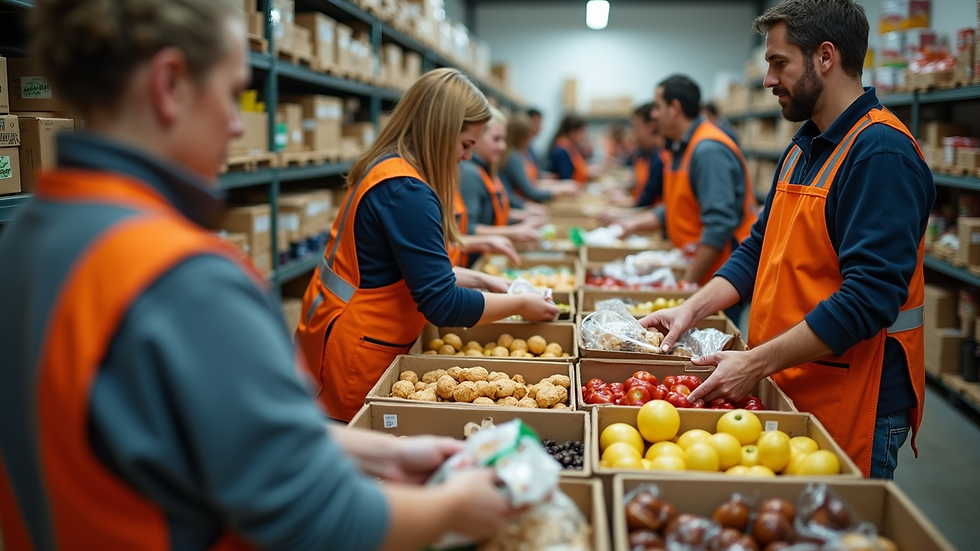Discover Local Food Pantries and How to Help
- Solo Faith Chuch

- Jul 26
- 4 min read
Hunger remains a critical issue in many communities across the United States. With increasing food insecurity due to various factors, including economic fluctuations and natural disasters, local food pantries have become a lifeline for those in need. This blog post aims to highlight the importance of local food assistance through food pantries, explain how you can get involved, and provide essential information on connecting with resources in your area.
Local Food Assistance: A Crucial Resource
Local food pantries serve as vital points of access to food for individuals and families facing hardships. They provide a wide variety of food items, including canned goods, fresh produce, dairy products, and meat. These resources are available to anyone who needs assistance, regardless of their circumstances.
According to Feeding America, around 34 million people in the United States experienced food insecurity in 2021. This number includes about 9 million children. As these statistics highlight, food pantries play an essential role in combatting hunger and ensuring families have access to nutritious food.

Food pantries are typically organized by local community organizations, religious institutions, or charitable groups. They often operate on a non-profit basis and rely heavily on volunteers and donations from the community. By contributing your time or resources to a food pantry, you can make a direct impact on your community.
Finding Food Pantries in Your Area
To find a food pantry near you, start with a simple online search or visit the website of reputable organizations like Solofaith Food Bank. They provide an extensive list of available food pantries by state and county. You can enter your zip code or search for a specific area to locate assistance nearby.
Additionally, local charities and community centers often have information about food pantries in your area. They can direct you to specific organizations based on your needs or circumstances. Don't hesitate to reach out for help; resources are available for you.

What is the Difference Between a Food Bank and a Food Pantry?
Understanding the difference between a food bank and a food pantry helps clarify how these resources function within communities.
Food Bank: A food bank is a large-scale operation that collects, stores, and distributes food to various charities and agencies, including food pantries. Food banks frequently work with local, state, and national food suppliers, collecting excess food donations and managing inventory. They serve as a central hub for food distribution.
Food Pantry: A food pantry, on the other hand, is a smaller organization that provides food directly to individuals and families. Food pantries are often supported by food banks but operate independently within a community. They typically require individuals to complete a registration process before receiving food assistance.
Both food banks and pantries are essential components of the food assistance network; however, they serve different functions. Understanding these differences can help direct your efforts to the correct organization based on your donation or volunteering goals.
Ways to Help Local Food Pantries
If you're looking to make a positive impact in your community, consider supporting your local food pantry in one or more of the following ways:
1. Volunteer Your Time
Many food pantries rely on volunteers to help with various tasks, including sorting and organizing food items, packing emergency food boxes, and distributing food to families in need. These volunteer opportunities are a great way to meet others in your community while making a difference.
2. Organize a Food Drive
One effective way to gather resources for a local food pantry is to organize a food drive. This could be initiated at your workplace, school, or community group. Reach out to your local pantry to understand their most-needed items and create a plan to collect donations over a specific period.
3. Make Financial Donations
While food donations are essential, financial contributions can also be incredibly valuable. Local food pantries often have purchasing arrangements with food banks that allow them to buy food in bulk at a lower cost. This means your dollar can stretch further through a direct monetary donation.
4. Raise Awareness
One of the most impactful ways to help is by spreading awareness about the food pantry and its offerings. Share their mission, services, and needs through social media or community boards. Inform friends and family about how they can contribute, whether through donations, volunteering, or referrals.

Understanding the Impact of Your Contribution
The effects of your contributions to food pantries can be profound. When you volunteer or make a donation, you help provide critically needed resources for families experiencing food insecurity.
Food pantries not only supply food but also dignity and hope. By accessing food resources, families can use their limited income for other necessities such as rent, utilities, and healthcare. Thus, your role in supporting these agencies extends beyond the immediate act of providing food—you help people regain stability and improve their quality of life.
Furthermore, many food pantries integrate other support services, such as nutrition education and job training programs, into their operations. Contributing time or resources can foster wider community impacts and rebuild lives.
Final Thoughts on Supporting Local Food Assistance
In conclusion, food pantries are integral to combating food insecurity in our communities. By discovering local food pantries and understanding how to help, you contribute to something larger than yourself. Every small act counts.
Whether you choose to volunteer, donate food, provide financial assistance, or raise awareness about food insecurity, your efforts to support a food pantry near you can create a ripple effect of positive change. Together, we can work toward ensuring that no one in our communities has to face hunger alone. Let us unite in the fight against food insecurity and bring our communities closer together!




Comments